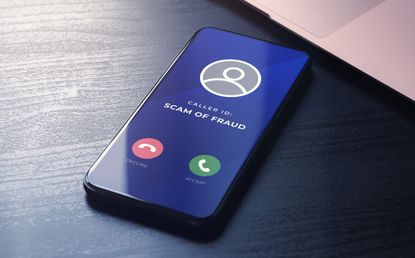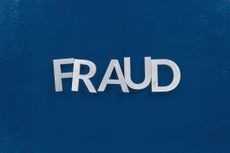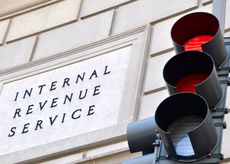IRS Warning: Beware of Smishing and 'Helper' Tax Scams
Tax season is a time to look out for email and text message scams.


April naturally comes with the stress of filing taxes (Tax Day, April 15, is just two weeks away). But unfortunately, tax season also comes with a heightened risk of tax scams. While you may be familiar with phishing scams that arrive via email, smishing is another threat to be aware of. The IRS has recently raised the alarm on evolving tactics like “smishing” and urges taxpayers to remain vigilant against these and similar schemes.
"Scammers are relentless in their attempts to obtain sensitive financial and personal information, and impersonating the IRS remains a favorite tactic,” IRS Commissioner Danny Werfel said in a release.
The IRS has been combating these fraudulent activities through initiatives like the “Dirty Dozen” campaign. This annual effort is designed to raise awareness and protect taxpayers, businesses, and tax professionals from falling prey to common tax scams.

Sign up for Kiplinger’s Free E-Newsletters
Profit and prosper with the best of expert advice on investing, taxes, retirement, personal finance and more - straight to your e-mail.
Profit and prosper with the best of expert advice - straight to your e-mail.
Here is more of what you need to know.
What is smishing?
Smishing, essentially phishing via SMS (short message service, known as text messages), occurs when scammers use text messages to deceive individuals into divulging personal or sensitive information.
- Tax scammers leverage smishing to trick taxpayers into revealing Social Security numbers and financial details.
- These fraudulent text messages often claim urgent issues with taxes or offer enticing refunds, urging recipients to click on malicious links or respond with personal information.
- Scammers often pretend to be someone you trust, such as a family member, friend, or a reliable organization. They use this tactic to trick you or your tax preparer into falling for their scams.
To avoid these scams, verifying the sender's identity before responding to text messages or emails is important. The IRS points out that you can do this by using a different method of communication, like calling a phone number you know to be genuine rather than the one provided in the suspicious email or text message.
Phishing vs smishing
Phishing and SMS scams operate similarly but differ in how the messages are delivered. Phishing typically involves fraudulent emails impersonating legitimate organizations like the IRS. The goal is to get you to click on malicious links or divulge sensitive information.
In certain situations, you may receive phishing emails that appear to come from genuine senders or organizations whose email account credentials have been stolen. The IRS advises setting up two-factor or multi-factor authentication with your email provider to help secure your email account.
On the other hand, smishing scams use text messages, often with alarming language, to prompt you to click on deceptive links or provide personal data. As with phishing, text message scams may also impersonate legitimate organizations.
- The IRS says that one of the most effective ways to protect yourself from phishing and smishing scams is to be skeptical when dealing with unsolicited emails or text messages.
- Be particularly wary of messages claiming to be from organizations like the IRS or state tax agencies, especially if they request sensitive information or threaten legal consequences for non-compliance.
Remember: the IRS never requests personal information via email, text, or social media. So, you should avoid responding to communications that claim to be the IRS or clicking on embedded links that may contain malware.
IRS third-party 'helper' scam
What about “helpful” scammers? The IRS is also warning about third-party “helper” scams. According to the agency, these begin with “swindlers posing as a "helpful" third party who offers to help create a taxpayer's IRS Online Account at IRS.gov.” '
In fact, the offer is being made to steal taxpayer information. The agency is reminding that taxpayers can and should establish their online account through IRS.gov without assistance from a third party.
IRS tax scams: Bottom line
Taxpayers can minimize the risk of falling victim to smishing and phishing scams by staying informed and cautious when it comes to their financial and personal information.
If you receive a suspicious email or text message claiming to be from the IRS, don't interact with the contents of the message, but forward it to phishing@irs.gov. Additionally, if you click on any links or provide confidential information in response to a scam text or email, take steps as soon as possible to safeguard your data.
For more information, see the IRS guide to identify theft.
Related
- Tax Season: Seven IRS Changes to Know Before You File
- IRS Email Scams to Watch Out For
- How to Pay the IRS if You Owe Taxes
- Warning: Watch Out for IRS Refund Mail Scam

As the senior tax editor at Kiplinger.com, Kelley R. Taylor simplifies federal and state tax information, news, and developments to help empower readers. Kelley has over two decades of experience advising on and covering education, law, finance, and tax as a corporate attorney and business journalist.
-
 Stock Market Today: S&P 500, Nasdaq Extend Losing Streaks
Stock Market Today: S&P 500, Nasdaq Extend Losing StreaksThe two indexes have closed lower for five straight sessions.
By Karee Venema Published
-
 Save Over $40 on Audible With Amazon's Latest Deal
Save Over $40 on Audible With Amazon's Latest DealAmazon’s latest promotion lets you score three months of Audible for just $0.99 a month.
By Erin Bendig Published
-
 'Instant' EV Tax Credits Are a Hit: $580M Paid This Year
'Instant' EV Tax Credits Are a Hit: $580M Paid This YearEV Credits Claiming federal electric vehicle tax credits at the point of sale is a new and popular option in 2024.
By Kelley R. Taylor Last updated
-
 Retirees Face Significant Tax Bills Due to Fraud
Retirees Face Significant Tax Bills Due to FraudFraud A new report sheds light on how older adult scam victims end up with big tax bills and lost retirement savings.
By Kelley R. Taylor Last updated
-
 Tax Day: Is the Post Office Open Late?
Tax Day: Is the Post Office Open Late?Tax Filing Tax Day means some people need to mail their federal income tax returns.
By Kelley R. Taylor Published
-
 High Earners: Beware of These Illegal Schemes to Lower Taxes
High Earners: Beware of These Illegal Schemes to Lower TaxesTax Schemes The IRS says high-income filers are targets for several illegal tax schemes.
By Katelyn Washington Last updated
-
 Mailing Your Tax Return This Year? What to Know Before You Do
Mailing Your Tax Return This Year? What to Know Before You DoTax Filing There are plenty of reasons not to mail your tax return this year, but here’s what you should know if you are.
By Katelyn Washington Last updated
-
 Most Expensive States to Live in for Homeowners
Most Expensive States to Live in for HomeownersProperty Taxes High property tax bills make the places on this list the most expensive states for homeowners to live in.
By Katelyn Washington Last updated
-
 Don’t Miss This $2,500 Tax Break for Paying Your Student Loan
Don’t Miss This $2,500 Tax Break for Paying Your Student LoanTax Deductions Do you qualify for the student loan interest deduction this year?
By Katelyn Washington Last updated
-
 What's Happening With the Employee Retention Credit and the IRS?
What's Happening With the Employee Retention Credit and the IRS?Tax Credits Due to fraud, the ERC has received much attention lately from the IRS and Congress.
By Kelley R. Taylor Last updated